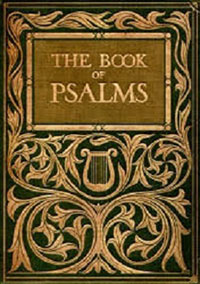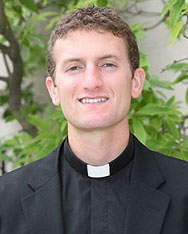

|
| Musical Musings: Miscellaneous |
|
|
Cultivating a Biblical Spirituality by Praying the PsalmsThis article is reprinted from The Catholic Spirit, the biweekly newspaper of the Diocese of Wheeling-Charleston, WV. It is reprinted with the kind permission of the author.
It is a good question, and this article will keep it in mind while presenting the Psalms as the Word of God in the words of men and women. All of Sacred Scripture shares in the movement of the Incarnation. Just as the Word became flesh when God became man in the person of Jesus, assuming the poverty of humanity, so the Word assumes the poverty of human language. The Word entrusts itself to our imperfect words. The Psalms provide a particularly delightful example of this dynamic: the Word of God is communicated through the words of the psalmist, which then become the words of all those who pray them. As we read and pray the Psalms, we should respect both the divine and human aspects of these prayers. The eternal Word comes to us by way of these words. Neither aspect can be eliminated. Dei Verbum, one of the Church's guiding documents on the interpretation of Scripture, affirms that God speaks in Sacred Scripture through people in human fashion, and therefore the interpreter of Sacred Scripture, in order to see clearly what God wanted to communicate to us, should pay attention to the "literary form" of a given book of the Bible. "For truth is set forth and expressed differently in texts which are variously historical, prophetic, poetic, or of other forms of discourse" [DV 12]. So, in order to enter into dialogue with God as we pray the Psalms, it is important to understand something of the stylistic technique of Biblical poetry. Knowing the genre helps to know what to listen for and how that particular art form seeks to communicate truth. Here we can briefly point out two characteristics of the Psalms that help us enter more deeply into them. First, as Robert Alter has shown in his The Art of Biblical Poetry, there is a common poetic technique to the strophes of most Psalms. Biblical poetry is guided buy a basic parallelism in which the first line states something, and the second line intensifies the first statement by repeating or sometimes empahsizing the same theme, but with different words and images. For example, Psalm 1 begins:
1. Happy those who do not follow the counsel of the wicked, (first point) Much more can be said about the poetic art of the Psalms, but a helpful first step is to pay attention to how one line is related to the previous line in a given verse. It is not a rigid rule of composition, but a guiding literary norm of Biblical poetry. Listening to this dynamic can draw us into a more attentive, involved prayer of the Psalms, as well as encourage us to rearticualte our own experience in prayer. A second notable characteristic of the Psalms is the interplay between praise and supplication. Leafing through the Psalms, one notices the great variety of human emotion expressed therein. This great variety can be loosely grouped into two large categories: psalms of praise, which thank God for the experience of salvation, and psalms of supplication, which cry out to God for help. A fascinating element is that the psalms of supplication almost always finish with praise. No matter how bad the situation expressed ("My God, my God, why have you abandoned me?" Psalm 22:2), the psalmist offers it to God and ends up singing a song of praise and gratitude ("For God … did not turn away from me, but heard me when I cried out. I will offer praise in the great assembly…" Psalm 22:25-26). This is incredibly important for our own prayer. We learn from the psalmist that supplication opens us to the dimension of praise. Pain and fear tend to close us in on ourselves as we become mired in our own desperation. But when our prayer of supplication is directed outward to God, to an Other who has proven his desire and ability to respond, the desperate circle of solitude and our "woe is me" prayer are opened to the wonder of God. The book of Psalms, also known as the Psalter, is a synthesis of the entirety of Scripture. Everything that we learn about God and humnaity converges in poetic form. In our human experience there is joy and suffering, gratitude and anger, cries for help and the need for forgiveness. The highs and lows of humanity are represented in the Psalms. Israel's memory of the good times and the bad become a prayer of supplication that asks for salvation and a prayer of praise that celebrates the experience of God.
Article appeared 18 May 2018 |
Submit Your Music / Contact Us / Company Description / Links
 All with eyes to see, wrote Saint Ambrose, can discover in the Psalms a complete gymnasium for the soul.
The Church is constantly praying the Psalms, marking the passing hours of each day with the Liturgy of the Hours, and thereby ensuring that humanity is constantly in prayerful converstaion with God.
Even so, the Psalms are sometimes overlooked and thier ability to speak to our lives is underappreciated.
Years ago when I was a seminarian getting into the habit of praying with the Psalms, I was posed a question by a thoughtful Catholic who did not understand why we should pray with the words of the psalmist and not merely our own words: Isn't it inauthentic to pray with someone else's words?
Why not just pray from your own heart, with your own words?
All with eyes to see, wrote Saint Ambrose, can discover in the Psalms a complete gymnasium for the soul.
The Church is constantly praying the Psalms, marking the passing hours of each day with the Liturgy of the Hours, and thereby ensuring that humanity is constantly in prayerful converstaion with God.
Even so, the Psalms are sometimes overlooked and thier ability to speak to our lives is underappreciated.
Years ago when I was a seminarian getting into the habit of praying with the Psalms, I was posed a question by a thoughtful Catholic who did not understand why we should pray with the words of the psalmist and not merely our own words: Isn't it inauthentic to pray with someone else's words?
Why not just pray from your own heart, with your own words?
 Returning to the question of why we pray with the words of the psalmist, we can affirm that they teach us to pray.
They don't artificially replace our experience, but rather help us to understand and pray with what we experience with the help of the words that God gives us.
They teach us to think in God's categories.
They teach us to recognize the presence of God in history and in our stories, making of our memories a prayer.
They become my words that express my prayer better than I could have on my own if God would not have taught me to speak.
I turn to God with my words that are also his Word.
It's no wonder, then, that Saint Augustine's commentary on the Psalms includes the exclamation: "My Psalter, my joy!"
Returning to the question of why we pray with the words of the psalmist, we can affirm that they teach us to pray.
They don't artificially replace our experience, but rather help us to understand and pray with what we experience with the help of the words that God gives us.
They teach us to think in God's categories.
They teach us to recognize the presence of God in history and in our stories, making of our memories a prayer.
They become my words that express my prayer better than I could have on my own if God would not have taught me to speak.
I turn to God with my words that are also his Word.
It's no wonder, then, that Saint Augustine's commentary on the Psalms includes the exclamation: "My Psalter, my joy!"